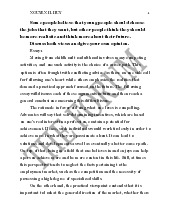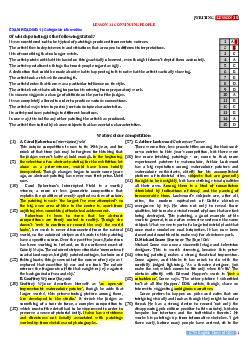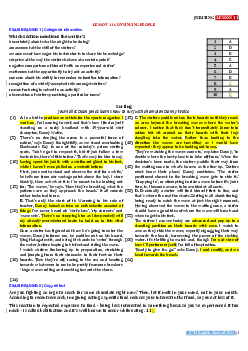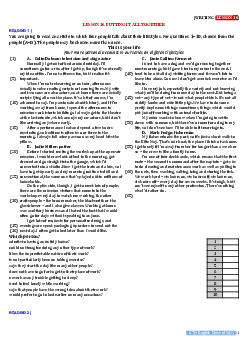

Preview text:
Checklist to improve your writing – Level C2
When writing any text it is useful to have a checklist to refer to so you can improve your written
English. The same checklist may also be useful to look at if you are checking a classmate’s work.
It can be used for any piece of writing that you do, as well as exam practice. This checklist is
useful for English learners who have a C2 level of English and it relates to the Cambridge
English C2 Assessment Scale, which our examiners use when they assess writing.
To assess a piece of writing, examiners consider these four things, called subscales:
• Content – how well the task has been completed; for example, have all the criteria for the
piece of writing been met?
• Communicative Achievement – how appropriate the writing is in terms of genre; for
example, who are you writing the text for and what expectations do they have?
• Organisation – the way the text is organised; for example, is the text focused on the main
aspects and how have you prioritised the information?
• Language – vocabulary and grammar; for example, are the language and grammatical
structures appropriate for the readership and the task, and how accurate is your work?
Look at the list below and try and match the examples of performance to the correct subscale.
1. Selecting the appropriate register for the readership. a. Organisation
2. Prioritising the information in the most suitable way.
b. Communicative Achievement
3. Choosing the most appropriate language for the readership. c. Content
4. Making sure the ideas are connected throughout the text. d. Language
5. Grading the complexity of the ideas for different readers. e. Organisation
6. Including the points the specific readers need to know. f. Content
7. Demonstrating full command of grammatical structures.
g. Communicative Achievement
8. Fulfilling all purposes of the task. h. Language
Here are some questions from the checklist and some explanations about why these questions
are important. Match the question with the correct explanation.
1. Do you need to demonstrate your own
a. The reader should be able to understand how all knowledge?
the individual ideas are connected in the text.
2. Do you need to include references to
b. Showing that you have a deep understanding of support ideas?
a topic may be necessary for certain readers.
3. Does your treatment of the topic need
c. Presenting other people’s views may require a simplifying?
more objective tone than when giving your own.
4. Is your text an organised and consistent
d. Texts can have more credibility if they detail whole?
sources of information and other writers’ views.
5. Are the views your own or those of other
e. Using the correct terminology ensures that your people?
text is on topic and suitable for the task.
6. Does the topic require any specific
f. Approaching the topic in different ways for vocabulary?
different readers ensures everyone understands. Checklist for writing C2
When you are producing a piece of writing, there are some questions that are useful to ask
yourself. These will help you edit and revise your work as you write. These questions are also
useful if you are checking a classmate’s work and can help you check and improve any text to
make it more appropriate in terms of: • Content • Communicative Achievement • Organisation • Language
• Have you selected the most appropriate information to cover the topic?
– Who are you writing the text for and what do they need to know?
– Do you need to demonstrate your own knowledge or are you writing to inform others?
– Do you need to include references or examples to support any ideas or information?
• Have you communicated your ideas in an effective way for the intended audience?
– Are you writing your text for other professionals or academics to read?
– Do you need to use a formal tone or a more simplistic tone for your audience?
– Are you presenting your own opinions or those of other people?
– Are there any particular writing conventions that you should include in your text?
• Is your text coherent and logically developed?
– What is the most effective structure for your text?
– Are the ideas linked throughout the text to form a cohesive whole?
– Have you covered all the points in equal measure or is there a focus on one point?
– Will the reader understand your argument and be able to follow your thoughts?
• Have you selected the most appropriate structures and language for the text and the readership?
– Are the grammar structures you have used appropriate for the text type?
– Have you used a range of vocabulary and grammar structures accurately?
– Is the functional language appropriate for the context and the readership?
– Have you checked for repetition of expressions and can you re-phrase any of them?
– Is there any topic-specific vocabulary which needs to be used and is this correct?




